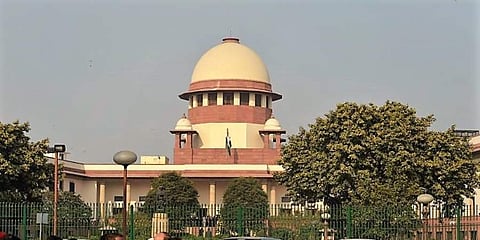

NEW DELHI: A senior journalist moved the Supreme Court on Monday seeking impleadment in a batch of petitions seeking a direction to permit the Muslim Women to enter and offer prayers inside mosque.
A 9-judge Constitution bench said on January 13 that it would deal with the larger issue of whether courts can intervene in "particular religious practices" and hear a batch of pleas including those seeking entry of Muslim women in mosque.
Other matters to be considered by the bench include the issue of entry of women and girls of all ages in Kerala's Sabarimala temple, female genital mutilation in the Dawoodi Bohra Muslim community and barring of Parsi women, married to non-Parsi men, from the holy fire place at Agiary.
The 9-judge bench is likely to take up for hearing these petitions in the first week of February.
The top court had on April 16, 2019, issued notice on a plea filed by Yasmeen Zuber Ahmad Peerzade and others seeking a direction to permit Muslim women to enter mosque to offer prayers and declaration of the customary tradition of denying them that as illegal and unconstitutional.
Petitioner Ziya Us Salam, currently associated with a leading magazine, had sought impleadment in the petition filed by Peerzade and said that neither the Quran nor the Hadith bars or prohibits the entry of Muslim women in mosques.
"That, neither the Quran nor the Hadith bars or prohibits the entry of Muslim women in mosques. In fact, in Quran at nearly 60 places, Allah asks both men and women to "establish" prayer, as opposed to merely offering prayer. Praying in isolation does not amount to establishing prayer," he said in his petition filed through advocate Farrukh Rasheed.
He contended in his plea that Prophet Mohammad himself permitted women to enter mosque and it is a permission well respected in mosques across West Asia, Europe and America.
"Men and Women pray at Masjid-al-Haram in Mecca and they pray in Al Masjid al Nabvi in Medina," the plea said, adding that Namaz is the second of the five obligatory pillars of Islam and is initiated with the recitation of the 'adhaan' which means a call for prayer.
He said that in India, though there may not be an explicit ban for women to enter mosques there is a "tacit ban" inasmuch as inter alia there is no separate entry for women, no separate ablution area for them and so on.
"This practice is against the tenets of Quran and Hadith. In India, Mosques are made by men for men. Women are seldom members of the mosque Committee and their needs and requirements are never taken into regard when mosques are constructed and managed. This passive discrimination is against the tenets of Islam and violates gender justice which is a Constitutional guarantee," his plea said.
He said that the practical ban on women to enter mosque in India violates her right to establish prayer in Mosque, which is permitted and encouraged by the Quran and Hadith.
Salam is an author of several books including one 'Women in Masjid- A quest for Justice', wherein he has argued that in Islam, Men and Women are equals and Islam does not prohibit the entry of Muslim Women in Islam, rather encourages it.
"When the muezzin pronounces, 'Hayya allas salah, hayya alal falah' meaning, 'come for Prayer, come for success' he invites everybody without any discrimination on the basis of gender.
The prayer is to be offered in the congregation and for this purpose, a mosque is created so that everyone can assemble at one place," the plea said.
He said in his plea that in India, women rarely offer their prayers in a mosque and sought impleadment saying that he can provide a reliable insight into the issues for consideration in the present petition and assist the court in making a fully informed decision.
"There are many verses in the Quran and Hadith (Bukhari Shareef and Sahih Muslim) in which the Prophet has in fact encouraged the women to pray in mosque.
The same will be cited and relied upon during the course of arguments," the plea said.